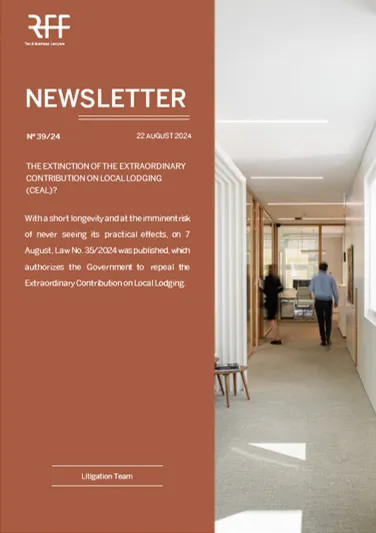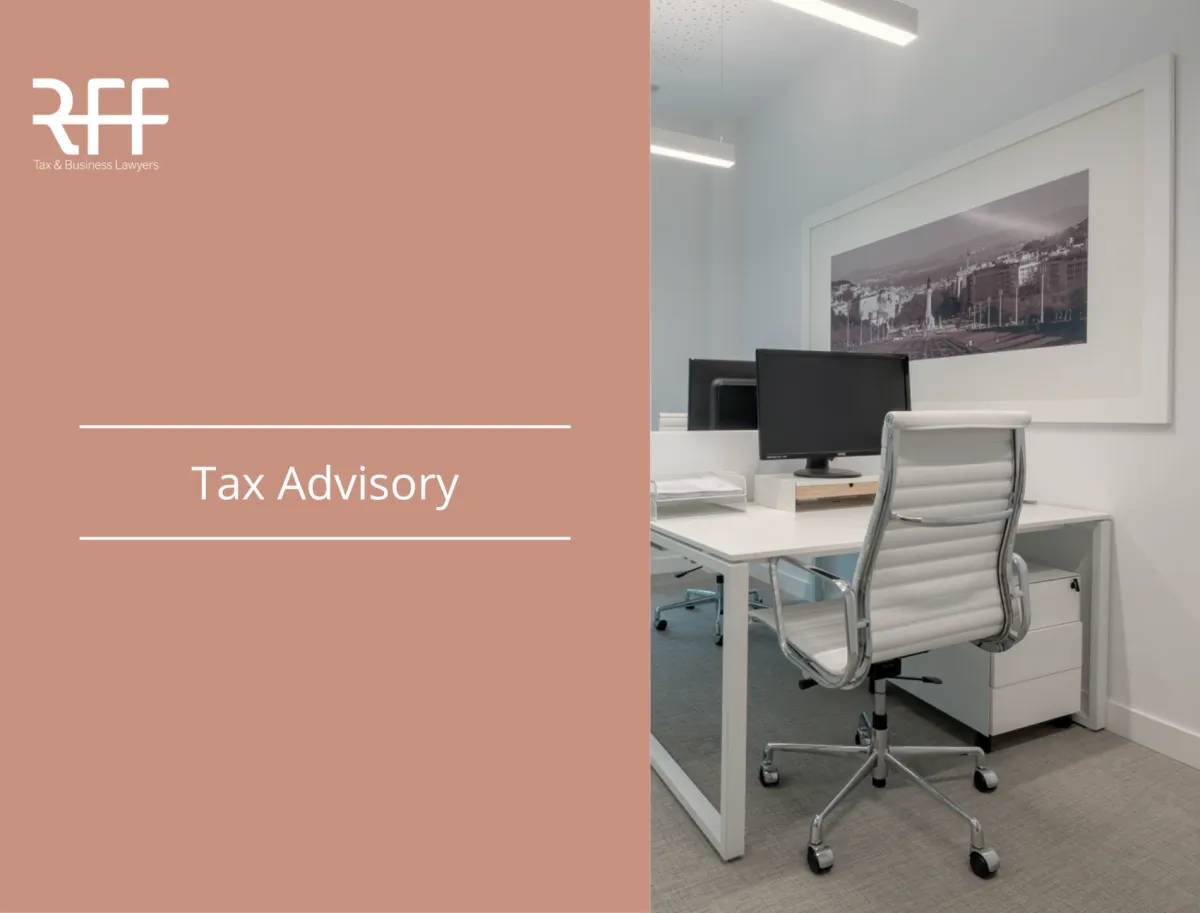The extinction of the Extraordinary Contribution on Local Lodging (CEAL)?

The extinction of the Extraordinary Contribution on Local Lodging (CEAL)?
With a short longevity and at the imminent risk of never seeing its practical effects, on 7 August, Law No. 35/2024 was published, which authorizes the Government to repeal the Extraordinary Contribution on Local Lodging.
INTRODUCTION
Law No. 56/2023, of 6 October, approved various measures to promote housing. Among them, it instituted the Extraordinary Contribution on Local Lodging (hereinafter CEAL), with the aim of taxing the allocation of real estate for housing purposes to Local Lodging and, thus, mitigating the negative externality felt in the housing market and the respective social cost.
Portaria No. 455-E/2023 (an executive regulation, therefore, "Portaria"), issued on December 29th of last year, regulated and defined the urban pressure coefficient, constituting, along with the economic coefficient, one of the values to be considered when applying CEAL.
However, half a year after its implementation, on 21 June, Parliament approved Draft Law No. 4/XVI/1.ª presented by the present Government, authorizing it to put an end to CEAL and to the setting of the coefficient of ageing – the whole number of years that have passed since the date of issue of the license to use, if any, or the date of completion of the building works – applicable to Local Accommodation establishments.
With the "Mais Habitação" (More Housing) program, the coefficient of ageing, which tends to decrease over the years, has led to an increase in the taxation of the Portuguese municipal property tax for properties allocated to Local Lodging, to the extent that, for these, the coefficient of ageing would always remain the same (which is, by the way, the highest value).
Now, and more recently, on 7 August, Law No. 35/2024 was published, which materializes the authorizations granted to the Government to repeal CEAL, as well as the setting of the coefficient of ageing applicable to Local Accommodation establishments for the purposes of assessing the Portuguese municipal property tax.
THE END OF CEAL
With the new Government taking office, some of the measures in its program involve reversing actions implemented by the previous Government's Mais Habitação legislative package.
These measures include the elimination of CEAL and the coefficient of ageing applicable to Local Accommodation establishments, but also the expiry of licenses prior to the Mais Habitação program, which determined that new registrations would be "valid" for five years and existing licenses would be subject to review in 2030, the year from which they could be renewed for successive periods of five years.
With these decisions, the Executive intends to invest in decentralizing the management of Local Accommodation licenses and transferring their respective regulatory and supervisory powers to the municipalities, allowing them to establish the conditions for issuing and registering new licenses.
It was in this context that, in May, the Council of Ministers approved the revocation of the CEAL and the limits on the duration of temporary tourist accommodation licenses.
In June of this year, the draft Law was approved by Parliament, allowing the Government to carry out the repeal of CEAL, which has now been formalized by Law No. 35/2024, of 7 August.
THE (PREVIOUS) CEAL REGIME
CEAL focused on the allocation of residential properties for Local Lodging, considering for this purpose the autonomous fractions and parts or divisions of urban buildings susceptible to independent use of a residential nature (duly licensed for this use).
However, given the extraordinary nature of this contribution, which aimed to mitigate the negative externality of the shortage of housing properties, CEAL was not levied on properties located in inland territories (identified under the terms of Portaria No. 208/2017, of 13 July), as well as on properties located in localities that demonstrated a situation of housing balance (i.e., that met the requirements stipulated in Law No. 56/2023, of 6 October).
Also exempt from CEAL were properties that did not constitute autonomous fractions, parts or divisions that could be used independently, as well as Local Accommodation units in own and permanent housing that did not exceed 120 days of operation during the year.
With regard to the subjective scope, the Portaria (an executive regulation) introduced the obligation to communicate the list of taxable persons (holders of operating licenses for Local Accommodation establishments and, in the alternative, property owners who do not hold an operating license) and valid Local Accommodation licenses between Turismo de Portugal, I.P., and the Tax and Customs Authority, by means of a protocol to be signed between the entities.
THE URBAN PRESSURE COEFFICIENT... AND THE ECONOMIC ONE?
The urban pressure coefficient resulted from the ratio between the positive change in reference rent per square meter in the area where the Local Accommodation was established (between 2015 and the year prior to the taxable event) and the positive change in reference rent per square meter in the area with the highest variation at national level.
In turn, the economic coefficient would be calculated from the quotient between the average annual income per room calculated by the National Statistics Institute and by reference to the year prior to the taxable event, and the minimum gross area of a one-bedroom dwelling (calculated under the terms of the General Regulation on urban buildings).
Under the terms of Law No. 56/2023, of 6 October, both coefficients would be published annually by portaria (an executive regulation) of the member of the government responsible for the area of finance, and those applicable to the year 2023 would have to be published, by legal force, within 60 days of the publication of that law.
However, the Portaria only introduced, in an attached table, the urban pressure coefficients for each locality applicable for the year 2023. Regarding the economic coefficient, which would also contribute to the calculation of the CEAL's tax base, the Portaria was never published.
For this reason – and on the grounds that the Government had submitted the aforementioned Draft Law for legislative authorization to Parliament (in order to be able to proceed with the repeal of CEAL) – by Order No. 30/2024-XXIV of the Secretary of State for Tax Affairs, the deadline for payment of this contribution was extended by 120 days, preventing the collection of CEAL for the year 2023 while the Draft Law was subject to the approval process.
After applying each coefficient, CEAL's tax base would be determined, on which the 15% rate would be levied.
It should also be noted that CEAL was levied even when the activity of operating the Local Accommodation did not generate income in relation to the expenses incurred and was not deductible for the purposes of determining taxable profit under the Portuguese corporate income taxation, even if it had been accounted for as an expense in the tax period.
THE EXTENSION OF PAYMENT
The CEAL should be assessed and declared by the taxable person by 20 June of the year following the taxable event, without prejudice to the fact that, in the absence of an assessment, the Tax Authority has the power to assess the CEAL of its own motion, which would, in this case, be notified to the owner of the property registered in the matrix on the date of the taxable event.
In the same sense, the owner of the exploited property would be subsidiarily responsible for the payment of CEAL, even if he did not hold the operating license of the Local Accommodation establishment.
CEAL was due to be paid by 25 June of the year following the taxable event, and in the event of late payment, default interest would be charged immediately.
However, due to the extension of the deadline for the liquidation and payment of CEAL, in order to approve the request for legislative authorization that could revoke it, the payment was never made.
With the authorizations granted by the recently published Law No. 35/2024, of 7 August, the repeal of CEAL will have effects (retroactively) on 31 December 2023, ensuring that no one will ever pay, or settle, this contribution.
For now, all that remains is for the Government to proceed with the repeal of CEAL within 180 days, with the imminent risk that this contribution will never take any effects.
FINAL CONSIDERATIONS
The repeal of CEAL represents a significant "tax relief" for operators in this sector, reversing a measure widely seen as a penalty that caused financial asphyxiation for Local Accommodation units – in addition to the Extraordinary Contribution, also reflected in additional tax charges in terms of the Portuguese municipal property taxation, given the coefficient of ageing for buildings that constituted Local Accommodation establishments.
Notwithstanding the initiatives that have already been taken, it is important to bear in mind that any future measure that provides for an amendment to Law No. 56/2023, of 6 October, which is still in force, and which does not address the meaning and scope of the aforementioned Law No. 35/2024, of 7 August, will still have to be subject to parliamentary approval. And, given the Executive's commitment to transferring the management of Local Accommodation licenses to the municipalities, also to consultation with the National Association of Municipalities.
***
Rogério Fernandes Ferreira
Vânia Codeço
José Pedro Barros
Álvaro Pinto Marques
Mariana Baptista de Freitas
Bárbara Malheiro Ferreira
Alice Ferraz de Andrade
Raquel Tomé Castelo
